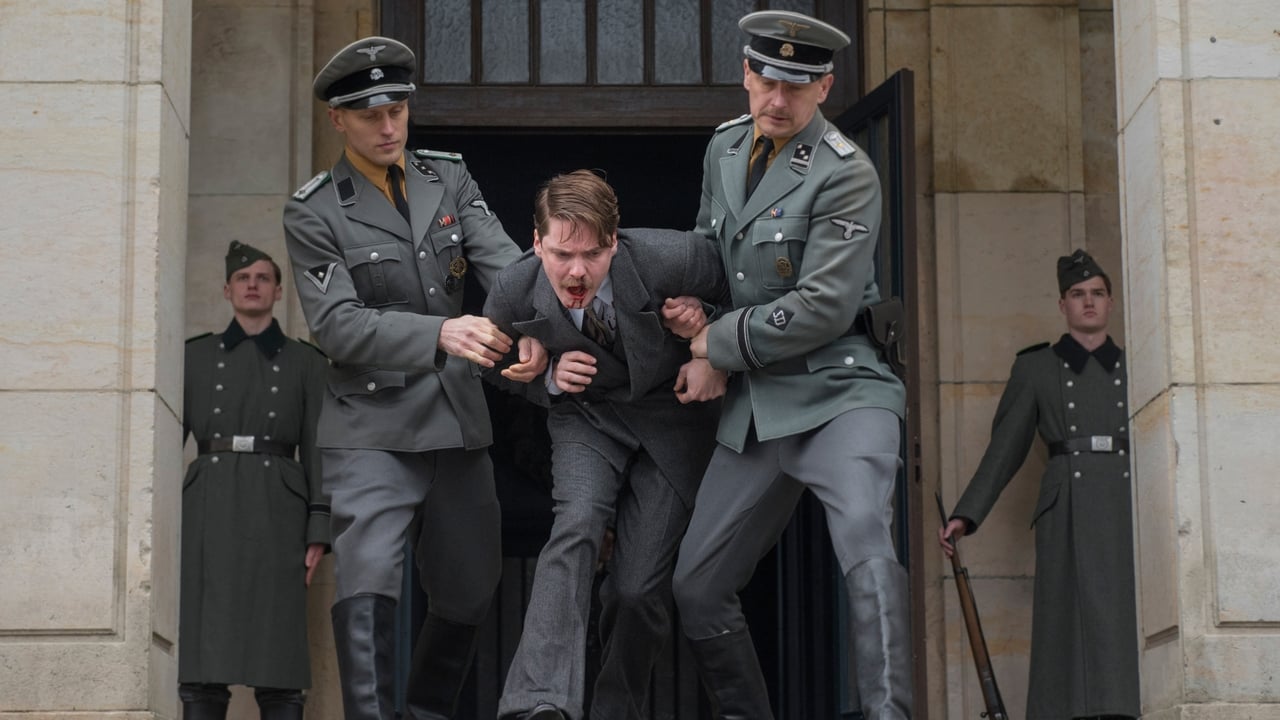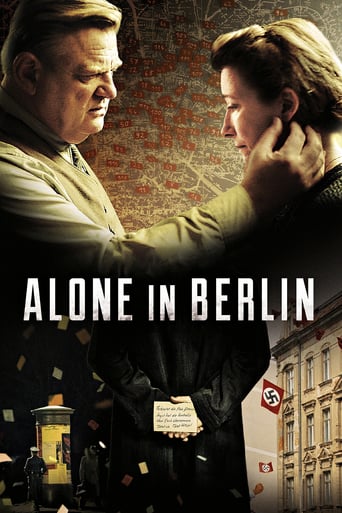lucasnochez
Running for his life, a young soldier Hans Quangel (Louis Hofmann) finds himself jolting in a bleak and otherwise bare forest somewhere in the battlefields of World War II. Scared, alone and out of breath, the young German soldier seems lost and directionless. As his breaths sharpen and his fear settle, the young soldier spends most of his run with his head looking back; whether it be an enemy, the war itself, or a version of himself he is fearful of becoming, the young Quangel maneuvers himself between the tall and dark trees, the mysteriousness of the forest and the impending and looming death that looks for many young men in the battlefields of war. Before anyone can make any sense of it, we hear a gunshot, fatally wounding the young soldier and forcing him to the ground. As his bright blue eyes begin to turn to grey, life fleeting him quickly and the forest embodying his body, Alone In Berlin begins with what seem like an insignificant death to many, but an impactful one for few. As the next scene cuts to a very bustling and busy city front in Berlin, a young newspaper boy yells at the top of his lungs, "Victory Over France", with cyclists, pedestrians and automobiles passing him. One of these people, is the city's many cyclist mail correspondents, delivering news from the Military Postal Services to civilians within the city, a not so glorified profession. As the cyclist makes her way through the city, she stops at a small and very ordinary looking building. The building, which provides a home to Otto and Anna Quangel (Brendan Gleeson & Emma Thompson), parents of the fallen Hans, sets forth a string of events that would change the course of the second World War and Germany's participation in it, forever.Alone in Berlin is a small film with very big ambition, following the events of two very persistent and hard working people. While Anna & Otto Quangel never really excited, the couple they are based off of were two very impressional individuals that caused a great uproar in Hitler's Germany from 1940 to 1943. The real life couple which the film is based from were Elise and Otto Hampel, a working class couple who created a very fundamental way of protest while living in Hitler's Germany, specifically Berlin, early in the second World War. Elise, who lost her brother in the war, distressed and ruined by the news, denounced Hitler. With the help of her husband Otto, the two began composing and leaving postcards within Berlin's most public places, which would very simply denounce Hitler's government, war and methods, informing the very average people of Berlin the perils of joining his war and his methods. For three long and secretive years, the Hampel's left over two hundred cards in Berlin, and only eighteen of the over two hundred cards were not reported and given to the local Gestapo, leaving them lasting to the people of Berlin who recovered them.While many inconsistencies can be found from the history books to the film's reenactments, director Vincent Perez does a marvellous job of keeping the content and tone of the film quite bleak yet extremely entertaining. Aside from the marvellous cinematography from Christophe Beaucarne and the miraculous score from Alexandre Desplat, the mood of the film is anchored effortlessly by the film's two incredibly talented lead actors Brendan Gleeson and Emma Thompson. The Quangel show a variety and range of emotions, without ever really saying much, even upon the very early discovery of their son's death, keeping their words short and sweet, but their actions fierce and impactful. The true anchors of the film are the two very talented actors who help guide the tension of Alone in Berlin throughout, without ever making the film of their performances melodramatic or overwrought.Another very powerful performance of the film is none other than the always impressive Daniel Brühl, an actor who can play a villain or hero without skipping a beat, and even turn his heroes or villain's to either side without hesitation. The very dramatic and theatrical cat and mouse game director Perez establishes between Escherich and the Quangels is one that keeps the audience engaged at all times yet really shows the very simple impact of their truth-telling letters the Quangels leave, even to members of the Nazi Regime. Brühl, Thompson and Gleeson are in top form from beginning to end.While screenwriters Achim von Borries, Bettine von Borris and Vincent Perez make great use of the source material written by Hans Fallada, Every Man Dies Alone, written in 1947, the screenwriters and director never overemphasize much of whats happening on the warfront of Berlin too much that it becomes severely unbelievable. Otto, who is portrayed of being a factory worker in the film, specifically, a manager in charge of producing coffins for fallen soldiers of the war, and Anna, being a domesticated mother and member of National Socialist Women's League in Germany, tread through their very sad lives after the news of Hans' death as many parents would. Yet, one of my favourite aspect of the film's and history's story is how such an average couple were able to make such a a large impact on the plans of a larger than life, and the world's most notorious non- fictional bad guy. Their letters, which cause such an uproar to the Third Reich, made them the Gestapo's biggest priority throughout the times of their letters in the early 40's.While Otto and Elise's letter often urged citizens from refraining of doing a handful of things, like; refraining from donating money to the Nazi regime, urging people to refuse to cooperate with the Nazis, refraining from using military services, all these very small and tedious acts acted as catalysts of overthrowing Hitler.
CineMuseFilms
War films are stories writ large about aggression between nations. Few of them explore small-scale human undercurrents of suppressed dissent inside the countries at war. Alone in Berlin (2016) does this by looking at an ordinary working-class couple and their compulsion to express feelings about Hitler's dictatorship at time where dissent meant certain death. It is also an essay on parental grief struggling to voice its pain of loss.Based on real events, the story opens in a small flat in Berlin where Otto Quangel (Brendan Gleeson) and his wife Anna (Emma Thompson) learn that their son has died in battle. In a long marriage that is under strain, the news pushes them further apart as they cannot console each other in grief. Otto had encouraged his son to join the Nazi army and now Anna blames him for their loss. Desperate to voice his rage against Hitler's regime, he painstakingly writes postcards and secretly leaves them on stairwells and doorways where they can be seen by passers-by: he calls them "small grains of sand in Hitler's machine". Initially he keeps Anna away from his dangerous mission, but she insists on being involved and they both become clandestine resistance fighters whose weapons are simple messages about the evils of Nazism. They manage to write and distribute over 260 cards despite extensive investigative efforts to stop them. In the process, they resurrect their marital relationship. After almost two years of card-writing they are caught and together face Nazi justice.This film has two parallel narratives that start in opposition and end in convergence: one is Otto and Anna's actions, the other is the investigation. The first is focused on the smallness of the couple's actions in contrast to the enormous risk they are taking, like a pair of mice squeaking at roaring lions. The filming, colour palette and period setting are drab and lifeless; the atmosphere is paranoid with suspicion and mistrust; and the acting is subdued and understated. Brendan Gleeson and Emma Thompson are actors with broad performance repertoires but here they are minimalist in expression and Spartan in dialogue, with much being conveyed through furtive glances or avoided eye-contact. It is a slow-moving story, observant of small details in an alienated world. This has the effect of amplifying the intensity of Otto and Anna's actions. Close-ups of a pen leaving a trail of outrage on a small white card become powerful portraits of bravery that are ultimately futile as most of the cards were handed in to authorities. The couple's nemesis is a young German investigator (Daniel Bruhl) who pursues his work with ideological fervour for the Fuhrer but whose success turns into the film's most devastating moments of despair.This is a joyless story about humble heroism. Otto and Anna are emblematic of ordinary people dealing with tragedy and anger inside a world of fear and danger. Far from being mere victims, their small protests seriously unsettled the Nazi hierarchy and the closing scenes are a tribute to the power of their "small grains of sand".

